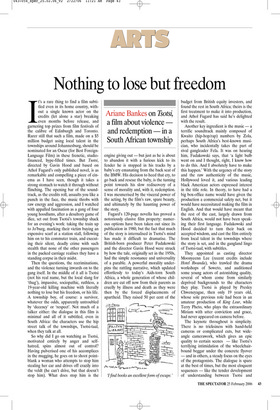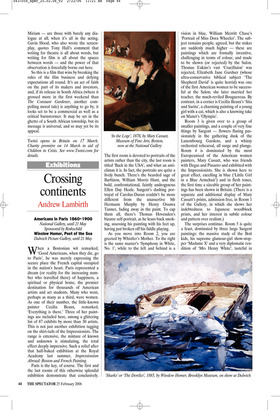Nothing to lose but freedom
Ariane Bankes on Tsotsi, a film about violence and redemption — in a South African township It’s a rare thing to find a film subtitled even in its home country, without a single known actor on the credits (let alone a star) breaking even months before release, and garnering top prizes from film festivals of the calibre of Edinburgh and Toronto. Rarer still that such a film, made on a $5 million budget using local talent in the townships around Johannesburg, should be nominated for an Oscar (for Best ForeignLanguage Film) in these frenetic, studiofinanced, hype-filled times. But Tsotsi, directed by Gavin Hood and based on Athol Fugard’s only published novel, is as remarkable and compelling a piece of cinema as I have seen, though it takes a strong stomach to watch it through without flinching. The opening bar of the soundtrack, as the credits roll, assaults you like a punch in the face, the music throbs with raw energy and aggression, and I watched with appalled fascination as a gang of four young hoodlums, after a desultory game of dice, set out from Tsotsi’s township shack for an evening’s work: taking the train up to Jo’burg, marking their victim buying an expensive scarf at a station stall, following him on to his commuter train, and executing their silent, deadly crime with such stealth that none of the other passengers in the packed carriage realises they have a standing corpse in their midst.
Then the questions, the recriminations, and the violence turning inwards on to the gang itself. In the middle of it all is Tsotsi (not his real name, but the local slang for ‘thug’), impassive, sociopathic, ruthless, a 19-year-old killing machine with literally nothing to lose but his freedom, or his life. A township boy, of course: a survivor, whatever the odds, apparently untroubled by ‘decency’ or ‘respect’. Not much of a talker either: the dialogue in this film is minimal and all of it subtitled, even in South Africa: the characters use the hip street talk of the townships, Tsotsi-taal, when they talk at all.
So why did I go on watching as Tsotsi, motivated entirely by anger and selfhatred, spins almost out of control? Having pulverised one of his accomplices in the mugging, he goes on to shoot pointblank a woman who attempts to stop him stealing her car and drives off crazily into the veldt (he can’t drive, but that doesn’t stop him). What does stop him is the engine giving out — but just as he is about to abandon it with a furious kick to its fender he is stopped in his tracks by a baby’s cry emanating from the back seat of the BMW. His decision to heed that cry, to go back and rescue the baby, is the turning point towards his slow rediscovery of a sense of morality and, with it, redemption. I was mesmerised by the visceral power of the acting, by the film’s raw, spare beauty, and ultimately by the haunting power of the story.
Fugard’s 120-page novella has proved a notoriously elusive film property: numerous options have been taken out since its publication in 1980, but the fact that much of the story is internalised in Tsotsi’s mind has made it difficult to dramatise. The British-born producer Peter Fudakowski and the director Gavin Hood were struck by how the tale, originally set in the 1950s, had the simple resonance and universality of a parable. A powerful morality underpins the rattling narrative, which updated effortlessly to today’s Aids-torn South Africa, a whole generation of whose children are cut off now from their parents as cruelly by illness and death as they were then by the forced displacements of apartheid. They raised 50 per cent of the budget from British equity investors, and found the rest in South Africa; theirs is the first treatment to make it into production, and Athol Fugard has said he’s delighted with the result.
Another key ingredient is the music — a terrific soundtrack mainly composed of Kwaito (hip-hop/rap) numbers by Zola, perhaps South Africa’s best-known musician, who incidentally takes the part of rival gangleader Fela. It was on hearing him, Fudakowski says, that ‘a light bulb went on and I thought, right, I know how to do this. And I absolutely have to make this happen.’ With the urgency of the story and the raw authenticity of the music, Hollywood loved it, and various leading black American actors expressed interest in the title role. In theory, to have had a big box-office name would have given the production a commercial safety net, but it would have necessitated making the film in English. And that would have meant that the rest of the cast, largely drawn from South Africa, would not have been speaking their first language. Fudakowski and Hood decided to turn their back on accepted wisdom, and cast the film entirely from local talent in the townships where the story is set, and in the gangland lingo of Tsotsi-taal, with subtitles.
They appointed as casting director Moonyeenn Lee (recent credits include Hotel Rwanda), who trawled the drama workshops of Soweto, and auditioned some young actors of astonishing quality, several of whom come from similarly deprived backgrounds to the characters they play. Tsotsi is played by Presley Chweneyagae, then only 19 years old, whose sole previous role had been in an amateur production of King Lear, while Terry Pheto, who plays the extraordinary Miriam with utter conviction and grace, had never appeared on camera before.
The keynote throughout is simplicity. There is no tricksiness with hand-held cameras or complicated cuts, but wideangle camerawork, which gives an epic quality to certain scenes — like Tsotsi’s terrifying intimidation of the wheelchairbound beggar under the concrete flyover — and in others, a steady focus on the eyes of the protagonists. The dialogue is spare at the best of times, but the most eloquent sequences — like the tender development of understanding between Tsotsi and Miriam — are those with barely any dialogue at all, when it’s all in the acting. Gavin Hood, who also wrote the screenplay, quotes Tony Hall’s comment that writing for theatre is all about words, but writing for film is all about the spaces between words — and the power of that observation is forcefully borne out here.
So this is a film that wins by breaking the rules of the film business and defying expectations all round. It’s an act of faith on the part of its makers and investors, and, if its release in South Africa (where it grossed more in the first weekend than The Constant Gardener, another compelling moral tale) is anything to go by, it looks set to be a commercial as well as a critical barnstormer. It may be set in the ghetto of a South African township, but its message is universal, and so may yet be its appeal.



































































 Previous page
Previous page